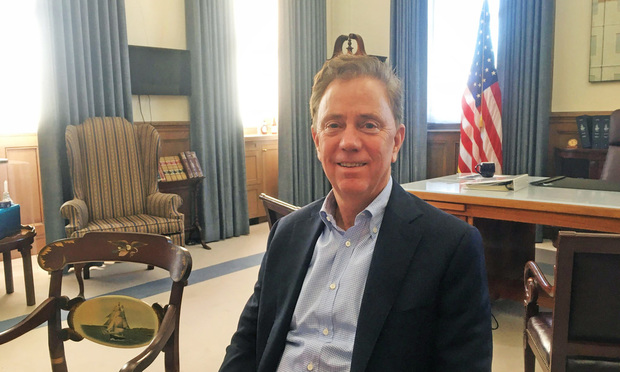Lamont Discusses Impeachment, State Issues in Sit-Down
The Connecticut Law Tribune sat down Thursday morning for a lively and informative question-and-answer session on some topics currently in the news.
December 20, 2019 at 12:55 PM
6 minute read
 Connecticut Gov. Ned Lamont. Photo: Robert Storace/ALM
Connecticut Gov. Ned Lamont. Photo: Robert Storace/ALM
As 2019 comes to a close, the Connecticut Law Tribune sat down Thursday morning with Connecticut Gov. Ned Lamont to discuss some of the top issues in the news including the state's hospital agreement and the impeachment of President Donald Trump.
Lamont, a Democrat who will turn 66 years old Jan. 3, and his legal team played a big role in solidifying the agreement with the state and its hospitals over taxes. State legislators ratified a seven-year, $1.8 billion settlement to end the lawsuit between the hospitals and the state, which the governor said will save taxpayers millions in the long run.
Lamont, who has thrown his support behind former Vice President Joe Biden, also weighed in on the impeachment this week in the U.S. House of Representative and discussed what he hopes occurs in the U.S. Senate. Our discussion follows:
Connecticut Law Tribune: What in your view is the case for impeaching Trump?
Gov. Ned Lamont: It is Jim Himes' case, Jim was our congressman and he was on the intelligence committee, and he made the case, I think, very eloquently. And, maybe, he will be a manager as it goes on to the Senate.
I think the House did the right thing, and I hope the Senate does the right thing. We have an election coming up in 11 months, and we had a president who was trying to influence that election. The idea of "let's hold off and let the voters (decide)" I think was the wrong way to go.
I think it's really important you make a statement loud and clear, and there was a real risk that we were trading our national interest for political and personal gain, and I thought that was really wrong. I can tell you tell that, more broadly for me as governor, I focus on Connecticut and do not go out of my way to challenge everything going on in Washington, D.C., except when it impacts the state.
CLT: What do you see as the top legal issue or issues in 2020, and how will you handle them?
Lamont: More broadly, this is sort of a litigation-happy society, and the state of Connecticut and Bob (Clark, Lamont's general counsel) and I inherited a lot of litigation that was going on, such as Sheff v. O'Neill. His team is working on that right now, and yesterday we cleaned up the hospital situation. That was a bill—litigation—that had been hanging over us like a black cloud for some time. There was also the tribes back and forth with MGM (in Springfield, Massachusetts) and the threats of litigation there.
What I don't want is litigation or the threat of litigation to stand in the way of progress. I know it's a cost of doing business everywhere across the country, but I'm very conscious of that going forward—doing everything I can to mitigate that risk
CLT: You have come out in favor of recreational marijuana in Connecticut. To play devil's advocate, what do you say to those who argue marijuana is a gateway drug and will only harm those who use it?
Lamont: I say we are finding out sadly that legal drugs are sometimes the most serious gateway drug—you've seen that in terms of the opioid epidemic, for example.
I tell you that I so fear having the illicit market, the black market, continue to take the lead when it comes to something like marijuana. I do think it ought to be carefully regulated in terms of how it's marketed and carefully regulated in terms of content.
Massachusetts has legalized it; Rhode Island, they got the bill; New York has got the bill; New Jersey, too. What are we going to be, some little island? It's impossible to enforce a world like that. We need to have some legal certainty, at least on a regional basis.
I'm not going to wait for Washington to take the lead on this. Doing this in a carefully regulated way is a lot better than the black market alternative.
CLT: Where do you stand on making sports betting legal in Connecticut? And please talk about the hurdles, especially those coming from the two Indian tribes with casinos in the state.
Lamont: That's been stuck in a legal muck for quite some time, but the tribes have been good partners for us as we've had a compact that goes back a generation.
We sat down just last week and began talking about how we can work together in terms of sports betting, for example. Maybe that's something we can work on together and get going in time for this new year. Whether you think sports betting is good or bad for our economy, it's part of our economy. Connecticut can get left behind, or we can be a part of that (sports betting).
I do favor sports betting in Connecticut. It's not like it's a big revenue raiser for the state, but what you are finding with a lot of these other states is that it brings a lot of people to a venue where it's great for our cities.
CLT: Talk about the deal worked out Wednesday between the state and its hospitals and why the agreement is so important.
Lamont: We started out saying legal clouds are a deterrent to economic growth and optimism in the state and probably the most ominous cloud out there was the lawsuit between the hospitals and the state.
It goes back way before my time, 2011-2012. The state got more and more aggressive on the tax on Medicaid, and, finally, the hospitals felt aggrieved and they brought suit.
There was a real risk that there could have been a $4 billion judgment against the state. Four billion dollars is about $400 million a year the taxpayers would have had to pay off for 20 years to pay off a judgment like that.
Yesterday, the Senate and the House voted yes. We have a compromise, and that compromise is going to save the taxpayers of the state hundreds of millions of dollars a year, and just as importantly it gives our hospitals a sense of fairness and that we are treating them right as partners. It also gives them some certainty. Included in the agreement was a small increase in Medicaid rates—not for next year, but for over the next seven years.
This content has been archived. It is available through our partners, LexisNexis® and Bloomberg Law.
To view this content, please continue to their sites.
Not a Lexis Subscriber?
Subscribe Now
Not a Bloomberg Law Subscriber?
Subscribe Now
NOT FOR REPRINT
© 2025 ALM Global, LLC, All Rights Reserved. Request academic re-use from www.copyright.com. All other uses, submit a request to [email protected]. For more information visit Asset & Logo Licensing.
You Might Like
View All

DC Lawsuits Seek to Prevent Mass Firings and Public Naming of FBI Agents
3 minute read

Trump Administration Faces Legal Challenge Over EO Impacting Federal Workers
3 minute readTrending Stories
- 1Munger, Gibson Dunn Billed $63 Million to Snap in 2024
- 2January Petitions Press High Court on Guns, Birth Certificate Sex Classifications
- 3'A Waste of Your Time': Practice Tips From Judges in the Oakland Federal Courthouse
- 4Judge Extends Tom Girardi's Time in Prison Medical Facility to Feb. 20
- 5Supreme Court Denies Trump's Request to Pause Pending Environmental Cases
Who Got The Work
J. Brugh Lower of Gibbons has entered an appearance for industrial equipment supplier Devco Corporation in a pending trademark infringement lawsuit. The suit, accusing the defendant of selling knock-off Graco products, was filed Dec. 18 in New Jersey District Court by Rivkin Radler on behalf of Graco Inc. and Graco Minnesota. The case, assigned to U.S. District Judge Zahid N. Quraishi, is 3:24-cv-11294, Graco Inc. et al v. Devco Corporation.
Who Got The Work
Rebecca Maller-Stein and Kent A. Yalowitz of Arnold & Porter Kaye Scholer have entered their appearances for Hanaco Venture Capital and its executives, Lior Prosor and David Frankel, in a pending securities lawsuit. The action, filed on Dec. 24 in New York Southern District Court by Zell, Aron & Co. on behalf of Goldeneye Advisors, accuses the defendants of negligently and fraudulently managing the plaintiff's $1 million investment. The case, assigned to U.S. District Judge Vernon S. Broderick, is 1:24-cv-09918, Goldeneye Advisors, LLC v. Hanaco Venture Capital, Ltd. et al.
Who Got The Work
Attorneys from A&O Shearman has stepped in as defense counsel for Toronto-Dominion Bank and other defendants in a pending securities class action. The suit, filed Dec. 11 in New York Southern District Court by Bleichmar Fonti & Auld, accuses the defendants of concealing the bank's 'pervasive' deficiencies in regards to its compliance with the Bank Secrecy Act and the quality of its anti-money laundering controls. The case, assigned to U.S. District Judge Arun Subramanian, is 1:24-cv-09445, Gonzalez v. The Toronto-Dominion Bank et al.
Who Got The Work
Crown Castle International, a Pennsylvania company providing shared communications infrastructure, has turned to Luke D. Wolf of Gordon Rees Scully Mansukhani to fend off a pending breach-of-contract lawsuit. The court action, filed Nov. 25 in Michigan Eastern District Court by Hooper Hathaway PC on behalf of The Town Residences LLC, accuses Crown Castle of failing to transfer approximately $30,000 in utility payments from T-Mobile in breach of a roof-top lease and assignment agreement. The case, assigned to U.S. District Judge Susan K. Declercq, is 2:24-cv-13131, The Town Residences LLC v. T-Mobile US, Inc. et al.
Who Got The Work
Wilfred P. Coronato and Daniel M. Schwartz of McCarter & English have stepped in as defense counsel to Electrolux Home Products Inc. in a pending product liability lawsuit. The court action, filed Nov. 26 in New York Eastern District Court by Poulos Lopiccolo PC and Nagel Rice LLP on behalf of David Stern, alleges that the defendant's refrigerators’ drawers and shelving repeatedly break and fall apart within months after purchase. The case, assigned to U.S. District Judge Joan M. Azrack, is 2:24-cv-08204, Stern v. Electrolux Home Products, Inc.
Featured Firms
Law Offices of Gary Martin Hays & Associates, P.C.
(470) 294-1674
Law Offices of Mark E. Salomone
(857) 444-6468
Smith & Hassler
(713) 739-1250










